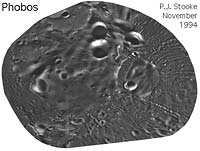|
COMETS EARTH JUPITER KUIPER BELT MARS MERCURY METEORITES NEPTUNE OORT CLOUD PLUTO SATURN SOLAR SYSTEM SPACE SUN URANUS VENUS ORDER PRINTS
PHOTO CATEGORIES SCIENCEVIEWS AMERICAN INDIAN AMPHIBIANS BIRDS BUGS FINE ART FOSSILS THE ISLANDS HISTORICAL PHOTOS MAMMALS OTHER PARKS PLANTS RELIGIOUS REPTILES SCIENCEVIEWS PRINTS
|
Related Document
Download Options
This image is a photomosaic of Phobos, the inner satellite of Mars. The original mosaic, at much higher resolution than shown here, was prepared by Peter Thomas, Damon Simonelli and colleagues at Cornell University. It was published in cylindrical and sinusoidal map projections in: Simonelli. D.P., Thomas, P.C., Carcich, B.T. and Veverka, J., 1993. "The Generation and Use of Numerical Shape Models for Irregular Solar System Objects", ICARUS, V. 103, pp. 49-61.and is also discussed in: Thomas, P.C., 1993. "Gravity, Tides, and Topography on Small Satellites and Asteroids: Application to Surface Features of the Martian Satellites", ICARUS, V. 105, pp. 326-344, 1993.Positions in the mosaic are controlled by a new shape model, described in those papers. A print of the cylindrical projection was kindly provided by D. Simonelli, and the digital shape data by P. Thomas. I filled small gaps in the mosaic using additional Viking images. For the image presented here, the three dimensional convex hull of the shape model was projected into the Morphographic Conformal Projection (the conventional Stereographic Projection modified for non-spherical worlds). The cylindrical projection mosaic was scanned and reprojected to fit the Morphographic grid. A higher resolution version of this map with latitude-longitude grid and feature names will be published in 1995. The leading side (longitude 90 runs vertically down the centre) faces forwards in the orbit of Phobos. The trailing side (longitude 270 runs vertically down its centre) faces backwards along the orbit. Longitude 0 is at the more sharply rounded end with the most prominent grooves, and faces Mars. As with all conformal (true shape) projections, the scale in these maps varies, increasing from the centre to the outer edge. The map projection is described in: Stooke, P.J. and Keller, C.P., 1990. "Map Projections for Non-Spherical Worlds / the Variable-Radius Map Projections", CARTOGRAPHICA, V. 27, No. 2, pp. 82-100. This version of the file, with labels intact, is in the public domain. Philip Stooke, Department of Geography, University of Western Ontario, London, Ontario, Canada N6A 5C2 [email protected] |
